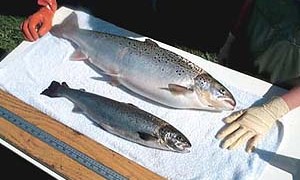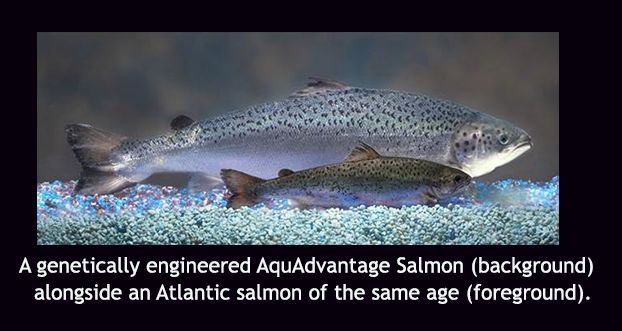
The U.S. Food and Drug Administration (FDA) has given a green light for GMO salmon to hit the consumer base for mass production. The salmon was genetically engineered by AquaBounty Technologies; the company engineered the fish with DNA that forces the salmon to grow incredibly fast. Many consumers have shown concern about this process, but the FDA assures the public it is safe, and edible for consumption.
The salmon will be called AquaAdvantage, and begins their inception within Panama contained facilities. The eggs will be produced in Canada, and once harvested, the GMO salmon will move to U.S. grocery store shelves.
The company is thrilled with the approval, but warns it could be a while before the salmon meets the commercialized demand expected. So, how can consumers know if the salmon they are buying is non-GMO or GMO? They will not be able to detect the difference, unless the company stamps it accordingly. In the approval, the FDA grants full disclosure of the GMO aspect to the company. Many anti-GMO activists scoff at the company voluntarily stamping their items GMO.
“I have yet encountered a company who willingly does so. Giving the companies the green light to mislead consumers with half-truths is a continued paradox of government interference sponsoring corporate lies,” says activist Toni Wilson.

One of the ways a consumer can become aware of the GMO factor, says Wilson, is to look for the COOL label on the packaging.
“The USDA requires imported fish to carry an country-of-origin label. This, in addition to ‘farm raised,’ will alert consumers this is the GMO fish made in Panama. While this is great for consumers who go grocery shopping, it gets lost in the gray zone when people are out at the restaurants, unknowingly requesting and eating GMO salmon. See, there is a loophole, because restaurants can basically lie to their patrons, because they are not required by law to be transparent.”
National Geographic has shared food engineering concerns, including long-term effects not sufficiently studied, and how the biotech foods can potentially harm the environment.
The GMO salmon may start hitting stores in under two years. Costco has already released a statement advising they have no plans to sell the genetically modified fish. Consumers are left to wonder if they can trust local grocers or statements since transparent labeling is merely a thought and not a requirement.
